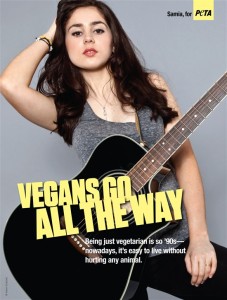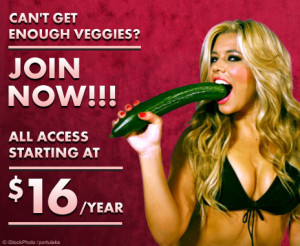
Vegans and vaginas, yes, there is an important connection. Hang with me here…
A colleague of mine mentioned to me that she would be using “the V word” in an essay she was working on and was worried about the push back she expected to receive. A little confused, I responded asking if she meant “vagina” or “vegan.” Honestly, given the stigmatization of both words, I had no idea which she meant. And I must not be the only one. When I conducted an image search for “the V word” to illustrate this essay, most of the results are pictures of feminists and vegan food.
I see news items from time to time in the feminist media chastising this or that organization for censoring the word “vagina.” I also hear a lot of talk in the Nonhuman Animal rights movement about moving away from the word “vegan” in favor of “vegetarian,” “veg,” “veg*n,” “plant-based,” “meat-free,” etc.
I’m wondering what exactly is so off-putting about vaginas and veganism. Why have these words become so stigmatized that they are often censored? What are we trying to hide? Who are we trying to silence?
VAGINAS: Many women have them; patriarchy wants to control them.*
VEGANS: Many activists are them; anthroparchy wants to control them.
I think the common factor between vaginas and vegans is that being loud and proud about them means posing a direct challenge to oppressive social structures.
But, if feminists wouldn’t dream of telling women to shut up about their vaginas, then why do professionalized welfare organizations tell people to shut up about their veganism?
Being a woman shouldn’t be something to be ashamed of, neither should being a vegan. Hiding these terms and identities away as if they’re dirty no-nos only serves to protect structural oppression. The strategy of silence does little to liberate. It will not be possible to make any headway as long as women, men, and the media are uncomfortable using the word “vagina.” The same holds true for vegans and Nonhuman Animal rights/welfare organizations that are uncomfortable using the word “vegan.”
*This essay is meant to be trans-inclusive. Not all women have vaginas, and some men have vaginas.
 Dr. Wrenn is Lecturer of Sociology. She received her Ph.D. in Sociology with Colorado State University in 2016. She received her M.S. in Sociology in 2008 and her B.A. in Political Science in 2005, both from Virginia Tech. She was awarded Exemplary Diversity Scholar, 2016 by the University of Michigan’s National Center for Institutional Diversity. She served as council member with the American Sociological Association’s Animals & Society section (2013-2016) and was elected Chair in 2018. She serves as Book Review Editor to Society & Animals and has contributed to the Human-Animal Studies Images and Cinema blogs for the Animals and Society Institute. She has been published in several peer-reviewed academic journals including the Journal of Gender Studies, Feminist Media Studies, Disability & Society, Food, Culture & Society, and Society & Animals. In July 2013, she founded the Vegan Feminist Network, an academic-activist project engaging intersectional social justice praxis. She is the author of A Rational Approach to Animal Rights: Extensions in Abolitionist Theory (Palgrave MacMillan 2016).
Dr. Wrenn is Lecturer of Sociology. She received her Ph.D. in Sociology with Colorado State University in 2016. She received her M.S. in Sociology in 2008 and her B.A. in Political Science in 2005, both from Virginia Tech. She was awarded Exemplary Diversity Scholar, 2016 by the University of Michigan’s National Center for Institutional Diversity. She served as council member with the American Sociological Association’s Animals & Society section (2013-2016) and was elected Chair in 2018. She serves as Book Review Editor to Society & Animals and has contributed to the Human-Animal Studies Images and Cinema blogs for the Animals and Society Institute. She has been published in several peer-reviewed academic journals including the Journal of Gender Studies, Feminist Media Studies, Disability & Society, Food, Culture & Society, and Society & Animals. In July 2013, she founded the Vegan Feminist Network, an academic-activist project engaging intersectional social justice praxis. She is the author of A Rational Approach to Animal Rights: Extensions in Abolitionist Theory (Palgrave MacMillan 2016).
Receive research updates straight to your inbox by subscribing to my newsletter.











